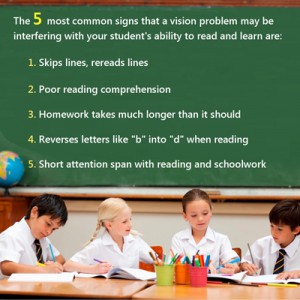
We would like to develop our version of an IEP (Individualized Education Program) for your child with learning disabilities. Whether the diagnosis is ADD/ADHD, Dyslexia, Autism Spectrum Disorder, or a generalized learning disorder, we can perform a developmental vision evaluation on your child which may reveal vision problems as the underlying cause of the learning disorder, or at the very least, a contributing factor to symptoms. Having this evaluation is critical, since 80% of what a child learns is visual, and vision problems are the fourth most prevalent class of disability in the United States.
After diagnosis, if your child is found to have a vision problem instead of a learning disorder, our “IEP” would consist of vision therapy (VT), a program tailored to your child’s needs consisting of exercises and activities that encourage the brain and eyes to work together for optimal learning. We also offer photosyntonics or colored light therapy in conjunction with VT. The length of our program depends on your child’s diagnosis, but if vision problems are the root of the issue, an IEP at school will no longer be necessary.
ADHD – Up to 90% of children with ADHD have unresolved vision issues that mimic the symptoms of ADHD and cause misdiagnoses. Vision therapy is preferable to barbiturates, and it comes without side effects, negative labels for the child, and a permanent cure.
Dyslexia – Poor eye teaming, tracking, and perceptual problems can be the root of dyslexic symptoms, which are treatable with vision therapy.
Autism Spectrum Disorder (ASD) – While we cannot cure ASD, we can improve visual symptoms such as obsessive focusing, the inability to focus, wandering eyes, and difficulty judging spatial relationships.
Symptoms of Learning-Related Vision Problems Include:
- Headaches or eye strain
- Blurred vision or double vision
- Crossed eyes or eyes that appear to move independently of each other
- Dislike or avoidance of reading and close work
- Short attention span during visual tasks
- Turning or tilting the head to use one eye only, or closing or covering one eye
- Placing the head very close to the book or desk when reading or writing
- Excessive blinking or rubbing the eyes
- Losing place while reading, or using a finger as a guide
- Slow reading speed or poor reading comprehension
- Difficulty remembering what was read
- Omitting or repeating words, or confusing similar words
- Persistent reversal of words or letters (after 2nd grade)
- Difficulty remembering, identifying or reproducing shapes
- Poor eye-hand coordination
- Evidence of developmental immaturity
If your child is experiencing learning difficulties or any of the above symptoms, it’s possible he or she may have a learning-related vision problem. To determine if such a problem exists, see an eye doctor who specializes in children’s vision and learning-related vision problems for a comprehensive evaluation.
Any one or combination of the above symptoms can contribute to a child being misdiagnosed with a learning disorder. A regular eye exam using a 20/20 chart CANNOT determine that vision is not the cause. The chart is used to check distance (20 feet) vision only, and has nothing to do with near vision needed for reading, laptop usage, or homework. A developmental vision evaluation will check all areas of vision, including the 17 near-vision skills needed for learning.
Click below to see some of the success stories from other families whose children had a learning disorder that was corrected or improved with vision therapy:
- ADD/ADHD
- Autism Spectrum Disorder
- Dyslexia
- Learning Disabilities, General
- Gifted Learning Disabled
- Special Education
Michelle, age 8:
Problems prior to Vision Therapy:
- Frequent headaches
- Difficulty reading (loss of place, substitutes words, sequential problems, difficulty with phonetics)
- Problems with spelling
- Smart but struggled in school
Benefits of Vision Therapy:
- No more headaches
- More confidence
- Receiving straight A’s in school
- Normalized all visual deficit areas
The school year is young. Some of you have already been fighting for an IEP for your learning-disabled child. We encourage you to explore one more option – bring your child to us. Our VT is top-notch with proven results. What if your child does not have a learning disorder at all, but a treatable vision problem that has gone undiagnosed?